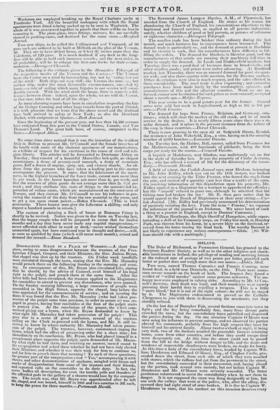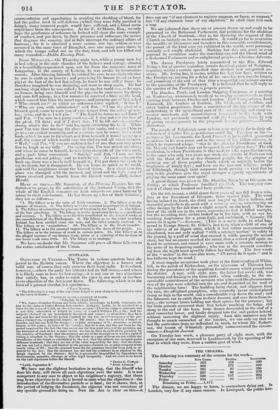IRELAND.
The Duke of Richmond, as Postmaster- General, has granted to the Scripture Readers' Society, as well as to the other religious and charit- able institutions in Ireland, the privilege of sending and receiving letters at the reduced rate of postage of two pence per letter, provided' each letter or packet does not weigh more than one ounce.—Dublin
Two men, named Thomas Cummins and Francis Canning, were found dead, in a field near Doneraile, on the 19th. There were nume- rous severe wounds on the heads of both. The Inquest Jury found a verdict of "wilful murder" against some persons unknown. The un- happy men were employed in valuing tithe. According to Mr. O'Con- nell's doctrine, their death was legal, and their murderers were merely pursuing their lawful duty in repelling a trespass. This is a little "more blood," but it is not of the right colour—he will not be stayed by it. The Magistrates endeavoured to prevail on the Catholic Clergymen to join with them in discovering the murderers, but they sturdily refused.
On the last day of Banagher Fair, several factions came into town to fight; and the day being remarkably fine, many from distant parts crowded the town, but the constabulary force patrolled and dispersed the parties during the day. On one occasion Captain O'Moore was seen using his influence to prevent outrage, and we observed the parties obeyed his commands, probably from the high respect they have for himself and his ancient family. About twelve o'clock at night, it being very dark, two of the factions assailed the peaceable farmers returning home, some from other counties, and before they could escape they were desperately cut. At this time the street could not be passed from the hill to the bridge without danger to life, and the doors and windows of respectable shopkeepers were broken, no doubt for booty. At this time a body of the constabulary force, headed by Captain Wil- liam Henderson and Edmond O'Moore, Esq., of Cloghan Castle, pro- ceeded down the street, from each side of which they were assailed with stones, which the ruffians had got from the pavement in the street, but the constabulary succeeded in their movement, and; having closed on the parties, took several into custody, but not before Captain W. Henderson and Mr. O'Moore were severely wounded. The latter gentleman volunteered to assist the constabulary when he saw them in danger. It is not supposed the stone was flung designedly at him, but one with the volleys that went at the police, who, after the affray, dis- covered they had eight stand of arms broken. It is due to Captain W. Henderson to state, that his conduct on this occasion deserves every
commendation and approbation in avoiding the shedding of blood, for had the police fired in self-defence (which they were fully justified in doing), many innocent people wonld have suffered, and a blood scene might have been the consequence. As for E. O'Moore, Esq., we only hope the gentlemen of influence in Ireland will show the same example of conduct, and put down, by their presence and influence, the scenes that disgrace the country, and at fairs interrupt the ordinary affairs of business ; for it is admitted a more serious riot has seldom or ever occurred in the same town of Banagher, save one many years since, in which the troops called out on the duty fired, and left ten killed and many wounded.—Dublin Evening Post.
IRISH MIRACLES.—On Thursday night last, while a young man lay in bed asleep in the state chamber of his father's mud cottage, situated in a beautifully-sequestered spot, not far from the romantic town of Lurganbov, in the county of Leitrim, he was awoke by harmonious sounds. Alter blessing himself, he rubbed his eyes to ascertain whether he was in earth or in heaven ; and perceiving his bosom friend (a large pig) at the foot of the bed fast asleep, he knew he was still at home : he therefore imagined he was dreaming, and went to sleep again. He had not long slept when he was culled; he sat up, but could see, as be says, no human being save himself and the pig—so be once more lay down, and soon fell asleep ; in a few minutes he received a blow on the head, which roused him from his sweet repose, and jumping out of bed, asked
" Who struck me ?" to which an unknown voice replied, " It was 1." " Who are you, with submission ?" said Pat. " I am the ghost of a blessed spirit, come to warn you of your danger from the colour of flier- bus; arise, and do as I tell you." " The Lord be &lune me mid harm !" said Pat. "I'm now in a purty mndereg—if I rise and see the face of the ghost, I'll faint; and if I don't rise, I'll be hilt intiml!,t—mnrther sheary, what's this to do ?" said he, again scratching his heed. While poor Pat was thus musing, the ghost hit him again, and ordeis•il him to
go to a convenient mountain, and at a certain spot he would lied a whin
bush, which he was to dig about, and from beneath it would spring up a well, the water of which would cure the cholera and all other diseases.
" Well," said Pat, "if you are making a fool of me, that you may never live to laugh at my folly." On saying this, Pat was struck senseless ; and when he came to himself, he was lying alongside of the whin bush,
and a spade lying convenient. " Surely," said Pat, " I now see the gentleman was not joking," and to work he set- As soon as he got the bush up, there was a lovely well beneath it ; Pat put down the spade to try its depth, but it disappeared. He ran home as quick as he could, and told the neighbours about the blessed vision. In a short t:me the place was thronged with the maimed and blind and the halt, many of whom received great benefit from the blessed water.—Bull..hannen Herald.
Moan or TIIEM.—Mr. Staunton, of the Morning Register, has un- dertaken to prove, to the satisfaction of the National Union, that the whole of the English reasoners on Irish subjects are most lament& ly astray in their conclusions. lie has drawn up a list of their fallacies ; they are as follows- . "1. The fallacy as to the ratio of Trish taxation. 2. The fallacy as to the amount of revenue. 3. The fallacy as to the assumed improvement of Ireland. 4. The fallacy of estimating the I ress o re of taxation by the head. 5. The fallacy of the four gun-brigs. 6. The fallacy as to the proportion hetwe,n rNpenditure and revenue. 7. The fallacy as to the debt transferred to the books at the consolidation of the Exchequers. 8. The fallacy as to the relief to which Ireland has been entitled since the war, and the relief actually received. 9. The fallacy as to 'assimilation.' 10. The fallacy as to the Stock transfers. 11. The fallacy as to the assumed improvement in the dress of the people. The fallacy as to the increase of trade in certain ports. 13. The fallacy as to the alleges1 increase of our foreign trade, taken as a criterion of the increase of our home trade since 1825. 14. The fallacy as to tonnage."
We have no doubt that Mr. Staunton will prove all these fallacies to the entire satisfaction of the Union.



















































 Previous page
Previous page